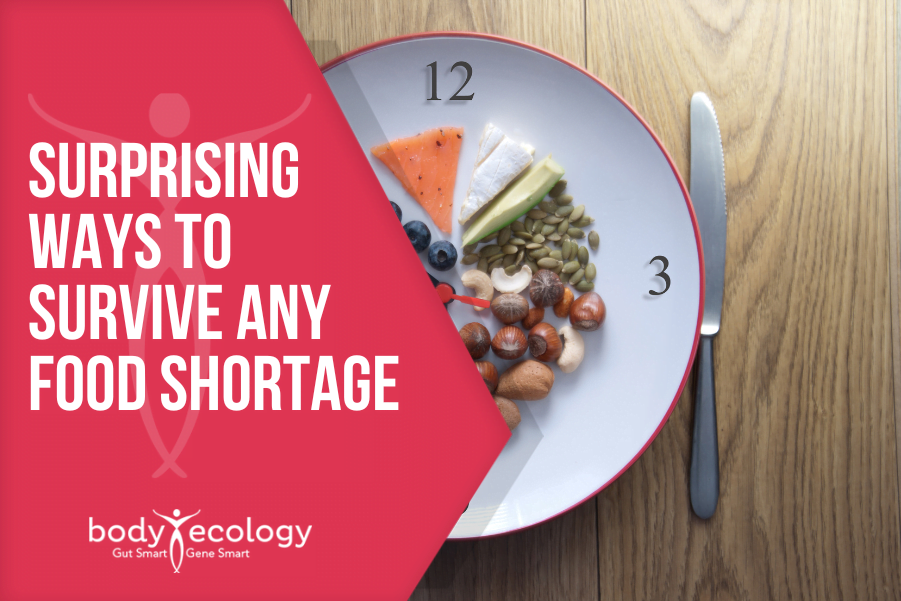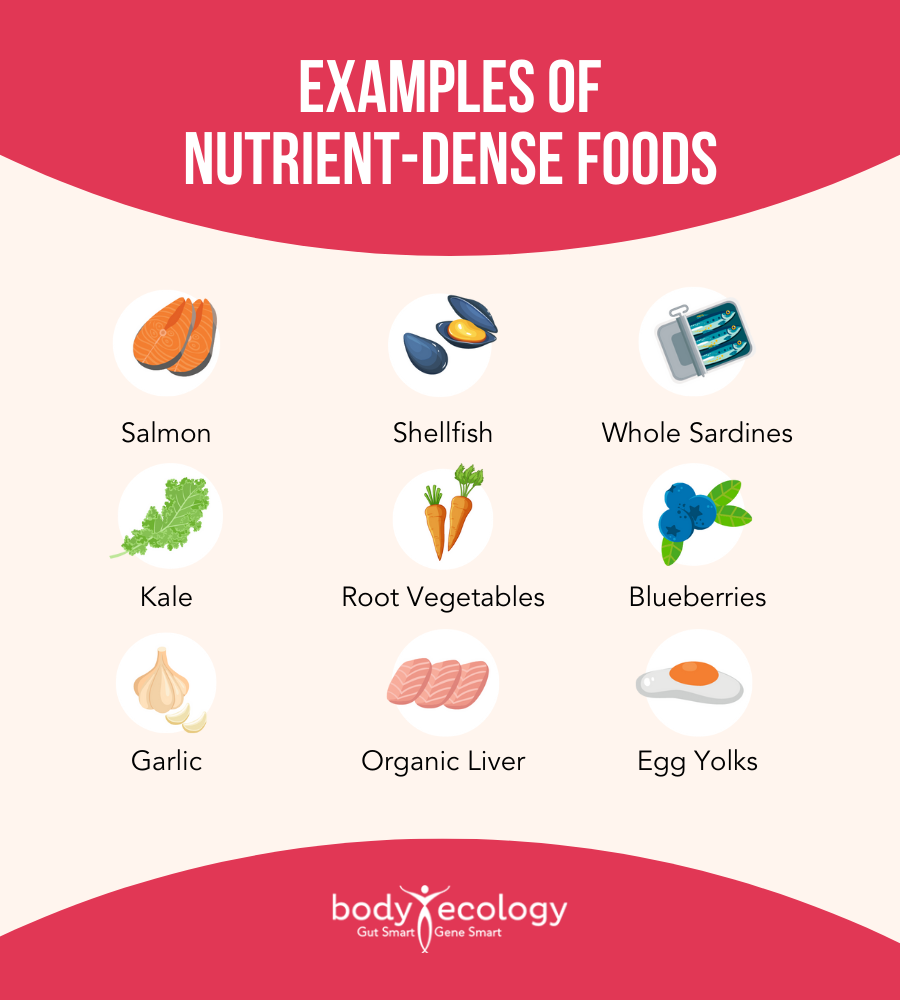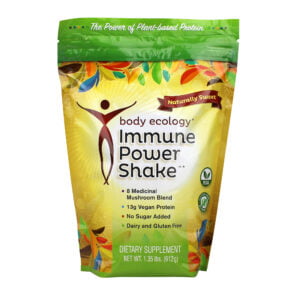Using Fasting & Nutrient-Dense Foods To Get Through The Next Food Shortage

Have you noticed more food shortages on your grocery store shelves lately?
Between inflation, labor shortages, war, weather, and rising transportation costs, many stores can’t get an adequate supply of many items. You may see a food shortage of beef and poultry, fresh produce, bread and baked goods, and dairy products. There’s even a global ‘coffee disappearance‘ as demand and pricing has skyrocketed in non-producing countries.
We recently talked about food shortages in general, and how it’s important to become less reliant on stores and learn how to grow and store your own vegetables. (And to ferment them to enhance their nutritional benefits for better gut health and enhanced immunity).
Now let’s take a look at a few more specific things that can help you get through a food shortage, including fasting, choosing nutrient dense foods, and replacing meals with healthy plant-based protein shakes.
Intermittent Fasting Or Time-Restricted Eating
Intermittent fasting and time-restricted eating has been a popular diet trend in recent years. But the practice has been used for thousands of years – both out of necessity and for therapeutic reasons. Fasting is more than just a trend, and could have some tremendous health benefits when done correctly for your own body and needs.
There are many ways to fast. With time-restricted feeding, you typically fast for 14-16 hours (say 7pm until 9-11am the next day), and eat all of your meals in an eight to 10 hour window. With other plans you may eat normally five days of the week, and only have one meal on the other two days (dinner-to-dinner). Longer fasting periods trigger the body’s immune system, reduce inflammation, and may help correct chronic illness and disease. A 24 hour fast helps reset the microbiome and can improve your gut health.
The benefits of fasting are extensive and well studied. Dr. Mindy Pelz, an expert on fasting, has a fantastic beginner’s guide to fasting that outlines the different types of fasting and the many benefits that she has seen in her practice, including:
- “Stimulating growth hormones (a fat-burning hormone) secretion by 1300%
- Trig
- gering autophagy, ie. cleaning up of damaged cells
- Stem cells generation
- Stabilizes blood sugar
- Immune system
- Depression and anxiety
- Detoxification
- Weight loss and improved metabolic function
- Slowing the aging process, longevity
- Helping autoimmune conditions
- Normalizing your insulin and leptin sensitivity
- Lowering blood pressure
- Thyroid conditions
- Chronic pain
- Candida, gut issues
- Gallbladder issues
- Improving biomarkers of disease
- Supporting hormones and fertility
- Menopause and perimenopause
- Normalizing ghrelin levels, aka “the hunger hormone”
- Reducing inflammation and lessen free radical damage
- Lowering triglyceride levels
- Memory function and mood
- Boosting brain power by stimulating BDNF (a brain-boosting hormone) by 400%
- Supporting the treatment and prevention of cancer”
Fasting and time-restricted eating is a natural solution to food shortages: when you eat less, and eat less often, you buy less food!
Before starting any fasting routine, it’s always advisable to talk to your healthcare provider. Dr. Pelz does not recommend fasting for people with extreme adrenal fatigue, complicated health conditions (unless you have a healthcare provider experienced with fasting coaching you), and women the week before their menstrual cycle. (Stay tuned to a podcast with Dr. Mindy Pelz and Donna in the near future!)
Choose Nutrient-Dense Food
When you DO eat, it’s very important to choose nutrient-dense foods.
If you’re fasting, you’ll need to break your fast with bone broth and healthy fats, such as nut butters. While opinions seemed mixed on this, the lower oxalate nuts are pecan, walnuts, pumpkin, pistachio, or macadamia. We always recommend you buy nut butters that are sprouted before they are blended into butter. The best sprouted nuts and nut butters are from Blue Mountain Organics; be sure to buy the ones that say sprouted on the label. Avocados and olives and their oils are good choices for healthy fats as well. Avoid sugar and carbs as they can cause your blood sugar to spike too quickly.
By choosing more nutrient-dense foods, you can effectively eat less while still getting the greatest amount and variety of nutrients.
In addition to choosing nutrient-dense foods for the simple fact that they’re healthier, these foods will keep you satisfied longer. This may help minimize cravings and snacking, which are often fulfilled with processed junk food. With food prices being so high, buying less processed food benefits both our bodies and our pocketbooks!
So what is considered a ‘nutrient-dense’ food?
Here are a few examples:

A Closer Look at What’s Inside These Nutrient-Dense Foods
Salmon – Rich in omega-3 fatty acids, protein, magnesium, potassium, selenium, and B vitamins.
Kale – Choose lacinato kale over curly kale as it is lower in oxalates. Kale is high in vitamin C, A, B6 and K1, plus potassium, calcium, magnesium, copper, and manganese. Other dark green leafy vegetables that are great to include in your diet are cabbage, brussel sprouts, and collard greens.
Garlic – Delicious and nutritious! High in vitamins C, B1, B6, and calcium, potassium, copper, manganese, selenium, and a sulfur compound called allicin. Garlic also has anti-cancer, anti-bacterial, and anti-fungal properties.
Shellfish – Clams, oysters, scallops, and mussels contain various B vitamins, C, and D, as well as zinc, copper, potassium, selenium, and iron.
Root veggies including potatoes, carrots, daikon, turnips, and winter squash – Note: Potatoes do have oxalates. But here at Body Ecology we have a way of preparing them to lower the oxalates. Cut them into pieces then boil in salted water until they are soft. Then pour off the water. By draining off that water you are lowering their oxalate content. Sorry but baking doesn’t work. Choose red skin potatoes as they are the lowest in sugar. Potatoes provide healthy carbohydrates, fiber, B vitamins, iron, potassium, copper, magnesium, and manganese. Potatoes also keep for months if kept in a cold place.
Organic liver – A nutrition powerhouse! High in vitamins B2, B5, B6, B12, and A, as well as niacin, folate, iron, phosphorus, zinc, and selenium.
Whole sardines – In addition to being high in omega-3 fatty acids, these tiny fish pack a mighty punch. They contain a little of almost every nutrient your body needs. When food shortages are a concern, it’s good to have tins of these on hand.
Blueberries – Contain powerful antioxidants that can help protect your brain, lower cholesterol, and even fight cancer.
Egg yolks – High in many vitamins, minerals, and nutrients, including choline, lutein, and zeaxanthin.
Replace Meals With Plant-Based Protein Shakes
With the shortages and rising cost of animal protein, many people are choosing plant-based alternatives. Other factors that have driven the $7 billion plant-based food industry include a focus on health and longevity, animal welfare concerns, and sustainability issues.
A plant-based protein shake is an excellent item to stock up on to help you get through food shortages.
When you are in a hurry and don’t have time to prepare a meal, or after a workout or when traveling, shakes provide protein, vitamins, minerals, and other nutrients. Body Ecology shakes also have the added benefit of containing beneficial probiotics, prebiotics, and immune-enhancing ingredients to support a hardy microbiome.
Our Probiotic Protein Shake contains 18.6 grams of predigested pea protein. Combined with the rice protein, you are drinking a complete protein with all of the essential amino acids needed to build muscle. Our shakes also contain a blend of probiotics to support gut health, plus vegan fatty acids, fiber, sea minerals, and a blend of greens. It really is a complete meal!
 Our newest shake, Immune Power Shake goes a step further. In addition to protein and a robust probiotic blend, this shake also contains prebiotics to feed the good bacteria in your gut, plus a blend of eight medicinal mushrooms that provide a rich source of beta glucans. The source of the beta glucans is the mycelium of the mushroom, not the fruit, so there is no unpleasant mushroom taste to the shake. Beta glucans have powerful immune balancing and immune boosting properties, plus they reduce inflammation and support digestive health.
Our newest shake, Immune Power Shake goes a step further. In addition to protein and a robust probiotic blend, this shake also contains prebiotics to feed the good bacteria in your gut, plus a blend of eight medicinal mushrooms that provide a rich source of beta glucans. The source of the beta glucans is the mycelium of the mushroom, not the fruit, so there is no unpleasant mushroom taste to the shake. Beta glucans have powerful immune balancing and immune boosting properties, plus they reduce inflammation and support digestive health.
Key Takeaways
 Rising costs and food shortages can be scary, but the key is to arm yourself with knowledge and be prepared.
Rising costs and food shortages can be scary, but the key is to arm yourself with knowledge and be prepared.
Learn how to grow your own veggies — even small garden containers can produce cabbage, carrots, ginger, and garlic. (Combine these four together to create a delicious cultured veggie recipe using Body Ecology’s Cultured Veggie Kit).
Beets, beet greens and beet powders are often recommended to boost nitric oxide.They are a root vegetable that is easy to grow but unfortunately they are very high in oxalates. Fermenting them is the perfect way to get rid of the oxalates yet increase your need for nitric oxide.
So plant your garden now, and in the meantime learn how easy and fun it is to ferment veggies. Besides knowing how to preserve your veggies during a food shortage, you’re adding beneficial probiotics to your diet to support your immune system.
Stock up responsibly on non-perishable foods.
Adopt an intermittent fasting schedule that works for you. Too many of us are obese and we need to eat less anyway. A food shortage could have certain benefits if you eat less and eat better.
Choose nutrient-dense food, and replace some meals with a plant-based protein shake.
Just making these small changes can save you money at the grocery store, and help you feel less anxious about the next food shortage.








